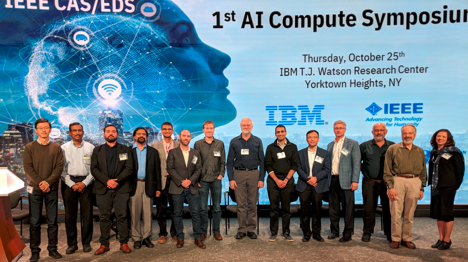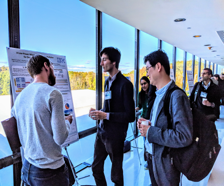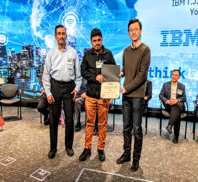AI Compute Symposium at the IBM T.J. Watson Research Center THINKLab in Yorktown Heights, NY
Together with the IEEE Circuits and Systems Society (CAS) and the IEEE Electron Device Society (EDS), IBM Research led the 1st AI Compute Symposium at the IBM T.J. Watson Research Center THINKLab in Yorktown Heights, NY, on October 25th 2018. This symposium brought together dreamers, thinkers, and innovators across industry and academia together for a one-day symposium focusing on cutting-edge research addressing AI Compute challenges and future directions of AI. The symposium consisted of two keynotes, six invited talks, a student poster session, and a panel discussion. The event was free of charge and had over 155 attendees from IBM, various companies and universities. IBM along with IEEE indeed showcased leadership and advancement in AI-Compute domain.
 Photo: Committee and Invited Speakers, L to R: Xin Zhang (IBM), Krishnan Kailas (IBM), Eduard Alarcon (UPC Barcelona Tech), Rajiv Joshi (IBM), Arvind Kumar (IBM), Matt Ziegler (IBM), Mike Davies (Intel), Rob Aitken (AMD), Naveen Verma (Princeton University), Wei Lu (University of Michigan, Ann Arbor), Todd Hylton (UC San Diego), Andreas Andreou (John Hopkins), Mark Wegman (IBM), Pamela Abshire (University of Maryland)
Photo: Committee and Invited Speakers, L to R: Xin Zhang (IBM), Krishnan Kailas (IBM), Eduard Alarcon (UPC Barcelona Tech), Rajiv Joshi (IBM), Arvind Kumar (IBM), Matt Ziegler (IBM), Mike Davies (Intel), Rob Aitken (AMD), Naveen Verma (Princeton University), Wei Lu (University of Michigan, Ann Arbor), Todd Hylton (UC San Diego), Andreas Andreou (John Hopkins), Mark Wegman (IBM), Pamela Abshire (University of Maryland)
Keynote talks were delivered by Lisa Amini from IBM and Rob Aitken from ARM. Lisa Amini provided an inspiring overview of research projects from the MIT-IBM Watson AI Lab, which has recently celebrated a one-year anniversary. Amini described three tiers of AI research spanning narrow, broad, and general AI. She posited that the AI research community is beginning a journey into broad AI, whereas general AI is still a long-term goal for the future. Rob Aitken followed with a keynote address describing how many emerging AI problems present dynamically changing goals and rules, rather
than the fixed goals and rules of conventional computing problems. Aikten also presented practical approaches for decomposing complex problems into manageable components that may provide a path for tackling complex AI challenges. Finally he concluded that the IoT need distributed systems with AI and ML application to IoT involves real time, explainability and security.
Following the keynotes, Mike Davies from Intel and Jeff Burns from IBM gave invited talks during the “Industry Perspectives” session. These talks provided a landscape of industrial research for both near and long term, spanning architectural, circuit design, and semiconductor technology. Mike Davies’ talk focused on Intel’s Loihi neuromorphic chip as well as future directions in neuromorphic research. Although Loihi is a digital chip, this avenue of research pushes beyond conventional von-Neumann architectures. On the other hand, Jeff Burns’ talk focused on current efforts and future plans for deep learning acceleration. Burns described a vision beginning with specialized digital accelerators in the near term with enhancements based on analog circuit design and future device technology in the future.


Photos: Poster session (left); poster winner (right)
Next, in the “Bio-inspired Computing” session, Andreas Andreou from Johns Hopkins University provided a number of examples of bio-inspired chip designs, many of which are components in systems that solve complex problems of interest to organizations like DARPA. In arguably the most provocative talk of the day, Todd Hylton from the University of California, San Diego, proposed the concept of thermodynamic computing as a potential future direction for computing research. Its evolution can be biased through programming, training and rewarding.
The third session on “Emerging Technologies” included talks by Wei Lu from the University of Michigan and Naveen Verma from Princeton University. Lu described recent research progress on RRAM (resistive random access memory) device and chip-level design and fabrication. He described how RRAM can provide a platform for neuromorphic computing, which is a promising direction for future AI computing. Naveen Verma delivered a case for circuit and architectural approaches for in-memory computing, another topic of high interest to the community. He presented measurement results from several fabricated chips providing compelling evidence for in-memory computing potential.
The symposium also had a well-attended student poster session, where about 30 students presented compelling research spanning numerous topics in AI computing. Two best poster presentations were awarded. One award was given to Sohum Datta from UC Berkeley for work on “A 2048-dim General-purpose Hyper-Dimensional Processor.” A second award was given to Jingcheng Wang from the University of Michigan for “Neural Cache: Bit-Serial In-Cache Acceleration of Deep Neural Networks.”
The symposium closed with a panel discussion entitled “Artificial Intelligence or Artificial Stupidity: How smart will smart AI be?” The panelists included the keynote and invited speakers, as well as IBM Fellow Mark Wegman. A lively and at times heated debate ensued where topics from the progress in AI research to AI ethics were touched upon. Todd Hylton presented a case that while progress in narrow AI challenges have made progress, the community is far from approaching true intelligence. At times Andreas
Andreou and Mark Wegman sparred over the future of AI research progress, while Naveen Verma wound up as the mediating voice. The panel discussion is scheduled to appear IEEE TV in the near future.
Overall, the general consensus of attendees, speakers, and organizers was that day provided a great platform for educational forum and lively discussions related to the most current compelling topics in the computing field. Additional publications (Book, Journal papers etc) based on the symposium technical content are planned to provide educational resources for anyone interested. Although early in the stages, future events based on AI Compute are being planned by IBM and IEEE, please see the following website for updates: http://ibm.biz/AIcomputesymposium
Last year IBM, CAS and EDS sponsored first of a kind emerging technology symposium (focusing on Neuromorphic, Quantum, Security based computing). It was attended over 180 folks and was major success in educating and directing the audience in the emerging directions. This initiative by CAS to attract industry folks is really paying off. Also it is driving the technology landscape with the help of industry. A true symbiotic process.
Rajiv Joshi, Matt Ziegler, Arvind Kumar, Eduard Alarcon